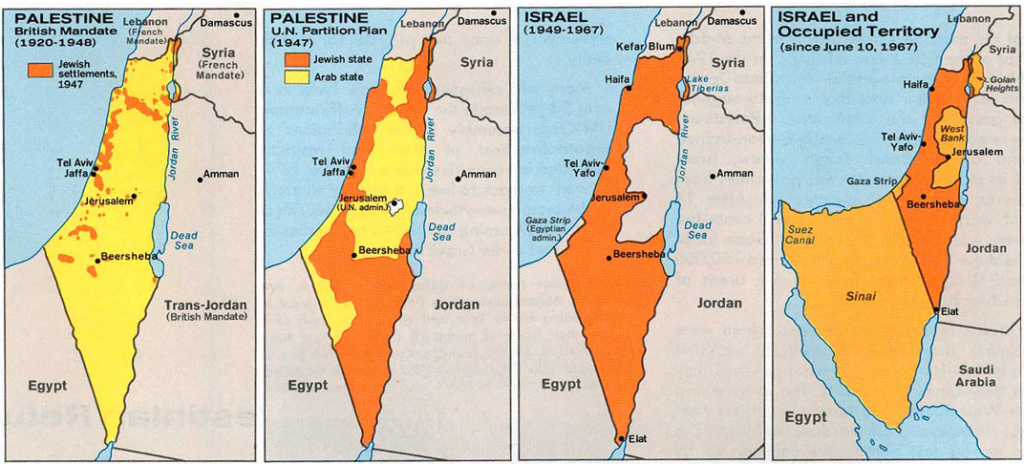By Serafeim Vylliotis
The world in which we live is undoubtedly complex, competitive, unpredictable and at times extremely dangerous, such as at this time, where, in addition to the war in Ukraine that has continued uninterrupted since February 2022, dangerous conflicts have broken out with unpredictable consequences in the Middle East as Israel in the context of dismantling the paramilitary branch of the Shiite organization Hezbollah and Sunni Hamas do not hesitate to launch attacks against countries in the Arab world of the region such as Lebanon and Syria, while its armed forces are also fighting Iran.
But how did Israel come to become the strongest military power in the troubled region, why is it turning against Arab countries, and how has Iran changed its alliances when you consider that until a few decades ago it had good relations even with the United States?
The Jews were forced by the Romans in the 1st and 2nd centuries CE to disperse and have suffered numerous persecutions over time. In 1492, for example, they were expelled from Spain where they had established an important center of trade, thought and culture, taking refuge in areas of the Ottoman Empire, North Africa, and Europe.
During the 19th century, Jews experienced severe discrimination and anti-Semitism in several European countries. In response to these racist manifestations, the Hungarian-Jewish journalist Theodor Herzl published in 1896 the book “Der Judenstaat” (“The State of the Jews”) which advocated the creation of a Jewish state as a solution to the “Jewish Question” and the discrimination that existed against them. It is considered a fundamental work of the Zionist movement.
Zionism was part of the broader climate of the European national movements of the 19th century and aimed to create a state where Jews would be safe from persecution. In 1917, the British Foreign Secretary Lord Balfour advocated the creation of a Jewish national home in Palestine, based on the principle of “One land without a people for a people without a land.” There may have been a people without land, But the land intended for him was not without a people. The rise of anti-Semitism in interwar Europe caused the mass emigration of Jews to Palestine, resulting in tensions.
After World War II, in response to the Nazi genocide against the Jews, the old idea of establishing a state for them would take shape. The UN proposed a plan to divide British-mandated Palestine between Palestinian Arabs (45%) and Jews (55%).

The State of Israel is established on May 14, 1948, on the basis of the relevant United Nations resolution. However, the solution of dividing Palestine into two states, one Jewish and one Arab, was rejected by the neighboring Arab countries (Egypt, Syria, Iraq, Jordan and Lebanon), which in response launched their first war against Israel (1948) and were defeated.
With the victory of the Arab-Israeli war, Israel now controlled 78% of the territory of Palestine. The refusal of Arabs to recognize Israel’s existence, the memory of genocide during World War II, and anti-Semitic traditions in many countries made Israel a state of refuge for many Jews. Living in a hostile environment, they always felt that their existence was threatened, while there they would be safe.
By winning the Six-Day War in 1967, Israel conquered the remaining 22% of Palestine and East Jerusalem, areas that formed the potential territorial basis of a possible future Palestinian state. General and former French President De Gaulle condemned the occupation of these territories in 1967, which marked the end of Israel’s strategic alliance with that European country and the beginning of that with the US. The Israelis themselves saw their state as Western and democratic, while many saw it as an advanced Western base in East-West competition. As a result, the alliance with the US seemed indestructible, and with the war on terror in 2001 it became stronger than ever. Despite its nuclear arsenal, undisputed military superiority, With strategic cover, a wide range of U.S. aid, and repeated offers of peace from Arab countries, Israel still lives in fear of its own destruction.
There are now few supporters of a negotiated solution with the Palestinians. The strong support of Donald Trump, who moved the US embassy from Tel Aviv to Jerusalem and recognized the annexation of East Jerusalem, the spectacular rapprochement with Saudi Arabia and the United Arab Emirates in the face of the Iranian threat, the diplomatic successes through the Abraham Accords (2020) and the absence of international pressure did not encourage Israel to make concessions, all the more so since Joe Biden did not intend to reverse his predecessor’s decisions. The two-state solution seems impossible in the long run.
An impossible peace
Since 2001 Israeli society has experienced a shift towards the Right and the Far Right. The issue of settlers is a burden on the government. Israel has had many diplomatic successes, while the assumption of the presidency by D. Trump guaranteed him total impunity. In the past, Barack Obama, who wanted to stop colonization, failed because of the full support given by the US Congress to Israel. Trump drew up a peace plan which it was welcomed by Israel, but rejected by the Palestinians. However, with Donald Trump’s mediation, the United Arab Emirates, Bahrain and then Sudan and Morocco recognized Israel and established diplomatic relations with it in 2020. Saudi Arabia established trade relations.
On October 7, 2023, exactly fifty years since the start of the Yom Kippur War, Hamas carried out a terrorist attack against the State of Israel. Just as then, the offensive launched by Anwar Sadat’s Egypt attempted to upset the balance of power in the region, so today Hamas’ offensive aimed to overturn the facts that had been set in motion (the Abraham Accords) for stability in the region of the wider Middle East.
The attack saw an unprecedented infiltration of Hamas (considered a terrorist organization by the EU and the US) into Israel from Gaza. It was the most serious escalation since the ten-day war between Israel and Hamas in 2021, and culminated in street killings. Israel, for its part, has launched a large-scale military operation across Gaza, causing a major humanitarian crisis. The conflict in Gaza, combined with hostilities on the Israeli-Lebanese border, threats and attacks by Yemen’s Houthi rebels, and threats by Shiite militants in Iraq and Syria, has destabilized the Middle East and created a context of escalation, which includes missile attacks between Israel and Iran.













